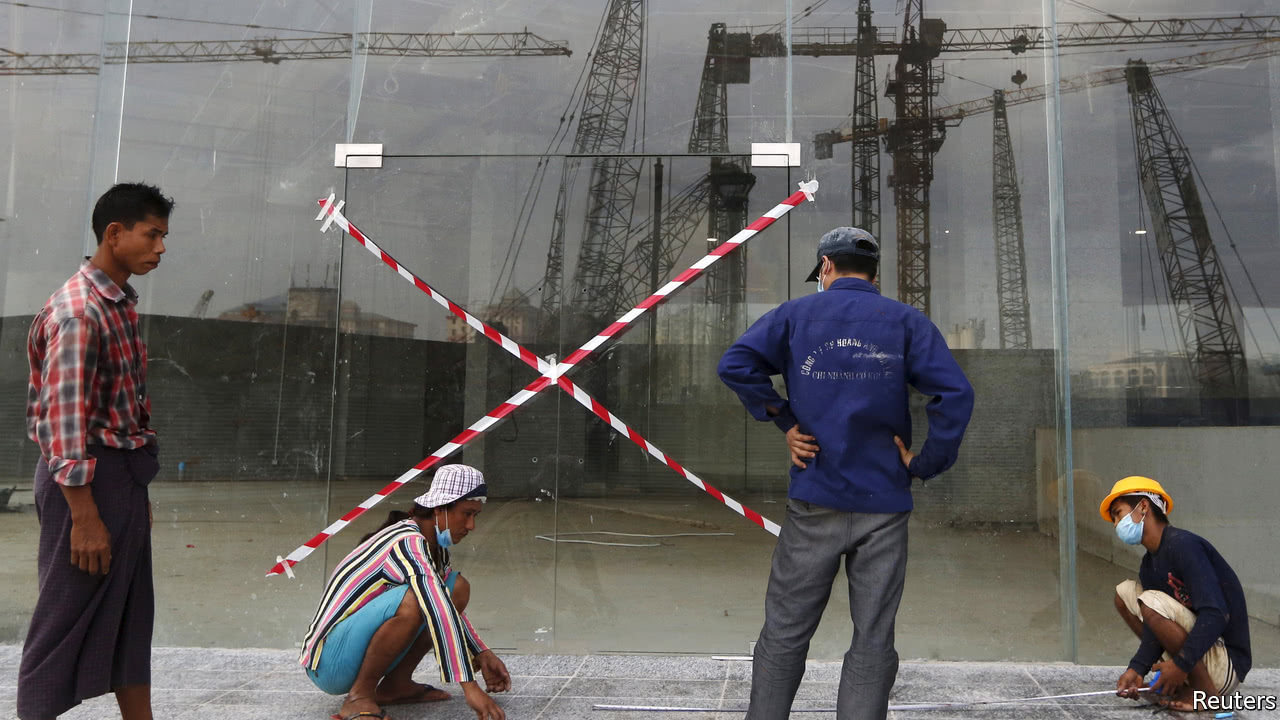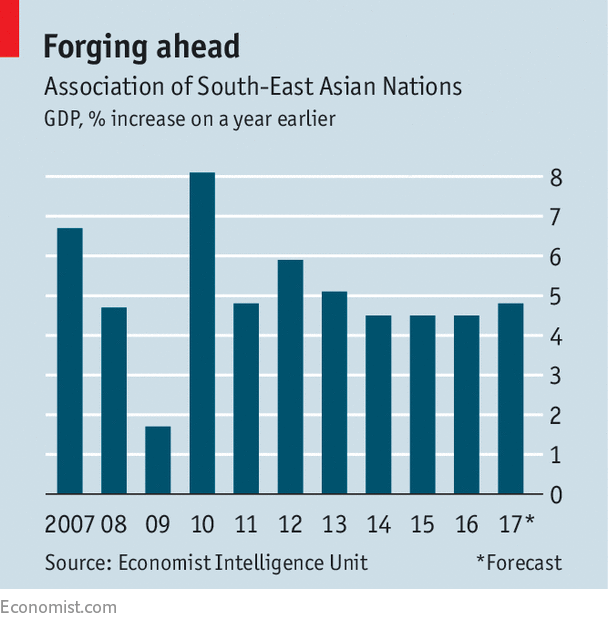Democracy is losing ground even as the region grows richer

THE young woman with the microphone cajoles, hectors and wheedles customers with the breathless enthusiasm of a livestock auctioneer at a county fair. She is standing behind a table stacked high with blue jeans; most of the milling crowd is dressed in lungyis, Myanmar’s skirt-like national dress. The fancy mall around them is anchored by a huge department store, dotted with banks and mobile-phone stalls and topped by a cinema and video arcade.
Myanmar has been growing so fast—by an average of 7.5% a year for the past five years—that the boom is reverberating in Mae Sot, just across the border in Thailand. Two years ago, says a longtime resident, the site of the mall was a swamp, and Mae Sot was a poky little border town with two small grocery stores. Today huge supermarkets, car dealers, electronics outlets and farm-equipment showrooms line the wide new road from the border into town, patronised by a steady stream of Burmese shoppers. Skeletons of future apartment blocks loom; the Thai government is building a new international airport. The Asian Development Bank (ADB) forecasts that Myanmar’s growth will hit 8% next year.
The region is full of such stories. Cambodia, Laos, the Philippines and Vietnam have been growing only slightly more slowly. Overall, the ten countries of the Association of South-East Asian Nations (ASEAN) grew at an annual rate of 5% over the past five years: not quite as fast as China or India, but much faster than Europe, Japan or America. The region’s 625m-odd people are growing richer and better educated; they will live longer, healthier and more prosperous lives than their parents. Of course, plenty of poverty remains—most people in Myanmar are still subsistence farmers—but the region’s economic trends are promising.
Back from the red
It was not always obvious that the South-East Asian economies would do so well. Only a generation ago Myanmar was cut off from the world by despotic generals; Cambodia’s 25-year-old civil war was still sputtering; and Vietnam was only just beginning to experiment with some timid market reforms. The wealthier countries in the region, meanwhile, had seen their economies, and the underlying models of growth, shattered by the Asian financial crisis of 1997.

The crisis proved salutary. Indonesia, the Philippines and Thailand all adopted sounder macroeconomic policies and made some effort to curb the cronyism that had accompanied earlier growth. Nominally communist Laos and Vietnam and autarkic Myanmar all embraced free markets, up to a point. The days of nationalisation and central planning seem to be over. In much of the region inefficient and coddled state-owned businesses endure, and rent-seeking, corruption and protectionism are all more common than they should be. But across South-East Asia, liberal economics has won the argument.
Politically, however, the region is moving in the opposite direction. The Asian crisis may have brought huge economic hardship, but it did at least unseat Suharto, Indonesia’s strongman of 32 years, and instigate political reforms elsewhere. In the years that followed, imperfect democracies in Malaysia, the Philippines and Thailand appeared to be gaining strength. And Myanmar, after years of isolation and repression, embarked on an unexpected transition to democracy.
But hoped-for openings never came in Laos and Vietnam, where the Communist Party has always been nakedly repressive. Singapore remains an illiberal, albeit effective, technocracy. The leaders of Malaysia and Cambodia, Najib Razak and Hun Sen, have proved depressingly adept at locking up critics and persecuting opponents. Cambodia’s most prominent opposition politician, Sam Rainsy, lives in exile to avoid imprisonment for a spurious conviction for defamation. Opposition figures in Malaysia find themselves in court on charges as varied as corruption and sodomy.
The junta that seized power in Thailand three years ago promises an election next year. Even in the unlikely event that it is free and fair, the constitution—which the army wrote and the new king signed in May—creates a junta-led Senate, imposes the generals’ 20-year plan on the country and provides ample grounds to remove any elected leader whom the army finds lacking. All this is designed to prevent voters from electing the “wrong” leaders, in the army’s view, as they have done at every opportunity over the past 15 years.
Democratic institutions are not yet quite that weak in the region’s two biggest countries, Indonesia and the Philippines, but in both liberals have more cause for fear than hope. Filipino voters, justifiably frustrated by the way that a few prominent families dominate politics, and by how recent economic growth has failed to reduce the high poverty rate, elected Rodrigo Duterte as president last year. Alone among the five candidates, he seemed to care about ordinary people; his brutal anti-drug campaign has appalled foreigners but is popular at home.
Mr Duterte reminisces fondly about the dictatorship of Ferdinand Marcos and seems to crave dictatorial power himself. He has declared martial law on the southern island of Mindanao (see Banyan), and often muses about doing the same nationally. He veers between indifference and hostility to troublesome principles such as due process, the separation of powers and the rule of law—all of which need shoring up, not weakening.
An election for governor of Jakarta in April, meanwhile, has harmed Indonesia’s reputation for religious tolerance (see next story). Islamist agitators campaigned against the Christian incumbent, Basuki Tjahaja Purnama, falsely claiming that he had insulted the Koran. Anies Baswedan, one of his rivals, embraced their shameless attempt to stir up sectarian tension, and won. Prabowo Subianto, a tub-thumping nationalist who lost the presidential election in 2014, backed Mr Baswedan. The fear is that Mr Prabowo, inspired by Mr Baswedan’s success, will try to foster similar divisions at the national level.
But it is Myanmar that most encapsulates the region’s democratic reversal. When the army ceded power last year to Aung San Suu Kyi, its Nobel-prize-winning opponent of 30 years, expectations were astronomically high, even though the constitution the generals had written severely limited her powers. That has made her government’s craven and repressive acts all the more bewildering. It has charged more reporters with defamation than did her military-backed predecessor. She has been shamefully silent about the continuing persecution of the Rohingya, a Muslim minority, not even admitting, let alone trying to stop, the army’s well-documented campaign of rape, murder and destruction against Rohingya villages. It does not help that since Donald Trump became president, America, long the loudest champion of liberal values in the region, has more or less let the subject drop.
No comments:
Post a Comment
Note: Only a member of this blog may post a comment.